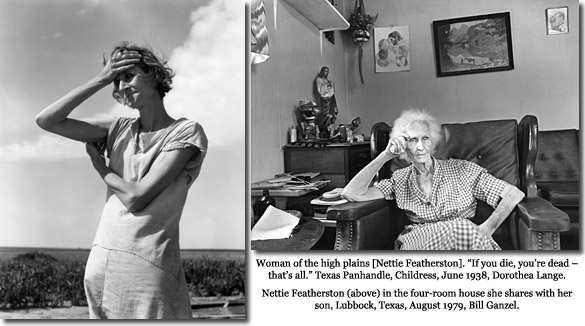

Nettie Featherston
"If you die, you're dead. That's all." Those are the words that Nettie Featherston was quoted as uttering by Dorothea Lange in 1938. This is a family who had been forced off their farm in Oklahoma and intended to get to California to find migrant work. They ran out of money in Childress, Texas. A local farmer took pity on them and hired the whole family to pick cotton for him. They ended up staying. To see other photographs of Nettie and portions of her oral history interview, click here or on the pictures above.

"If you die, you're dead. That's all." That sentiment is so desperate. So existential. So matter of fact. So eloquent coming from someone so poor. Nettie is important to the scope of the book because, if you think about it, this is a project that is essentially hopeful. I can only talk with the survivors. I can't talk with people who died of dust pneumonia. I can't talk with people who got completely lost in the migrant stream that they had no more ties back home.
I found Nettie because she had kept in touch with the farmer who hired them to pick cotton. I didn't have her name in the caption or even in Dorothea Lange's original field notes. So, I asked the local Childress newspaper to run her photo with an explanation of my project. The farmer knew Nettie had moved to Lubbock. She had never been able to get out of poverty, and so she is an important reminder that not everyone came out of the Depression better off.
